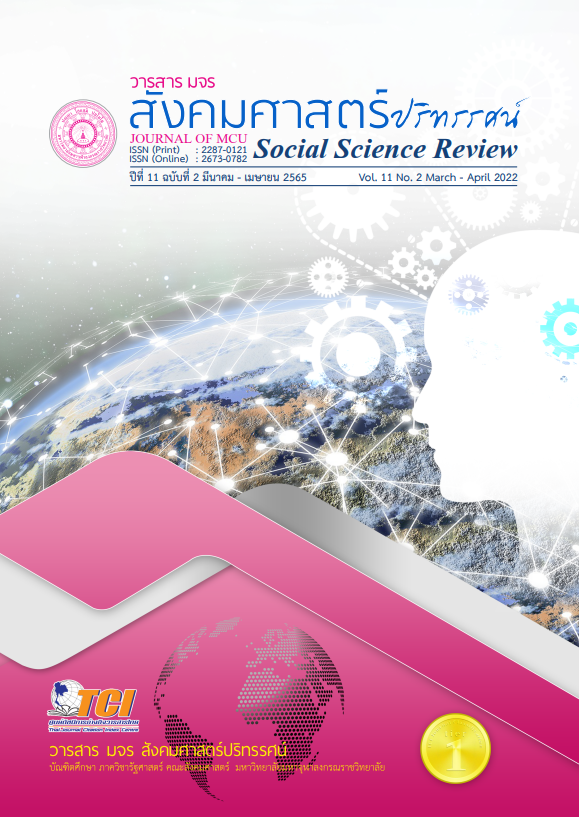นโยบายมุ่งใต้ใหม่ทางด้านการศึกษา: อำนาจอ่อนของไต้หวันต่อสถาบันอุดมศึกษาของไทย
คำสำคัญ:
นโยบายมุ่งใต้ใหม่, ไต้หวัน อำนาจอ่อน, สถาบันอุดมศึกษาของไทยบทคัดย่อ
บทความวิจัยนี้มีวัตถุประสงค์เพื่อ 1) ศึกษานโยบายมุ่งใต้ใหม่ของไต้หวัน 2) ศึกษานโยบายมุ่งใต้ใหม่ในด้านการศึกษาของไต้หวัน 3) วิเคราะห์อำนาจอ่อนของไต้หวัน และ 4) หาแนวทางปฏิสัมพันธ์ที่เหมาะสมระหว่างสถาบันอุดมศึกษาของไทยและไต้หวันซึ่งเป็นงานวิจัยเชิงคุณภาพ โดยเก็บข้อมูลจากคำสุนทรพจน์ เอกสาร งานวิจัยที่เกี่ยวข้อง และจากการสัมภาษณ์เชิงลึกกึ่งโครงสร้าง การวิเคราะห์ข้อมูลอาศัยกรอบแนวคิดทางด้านอำนาจอ่อน อำนาจอันชาญฉลาด นโยบายต่างประเทศ และแนวคิดผลประโยชน์แห่งชาติ แล้วจึงมีการอ่านผลและตีความ
ผลการวิจัยพบว่า 1) นโยบายมุ่งใต้ใหม่ประสบความสำเร็จในด้านการแลกเปลี่ยนผู้คนในด้านเศรษฐกิจ สังคมและการศึกษา ทั้งนี้นโยบายมุ่งใต้ใหม่นั้นไม่ได้เป็นนโยบายใหม่หากแต่มีวัตถุประสงค์และผลลัพธ์ขึ้นอยู่กับประธานาธิบดีในแต่ละสมัย 2) นโยบายมุ่งใต้ใหม่ทางด้านการศึกษาประสบความสำเร็จทั้งนี้เนื่องจากอัตราการเพิ่มขึ้นของการศึกษาต่อที่ไต้หวันและการแลกเปลี่ยนบุคลากรที่เน้นด้านภาษาจีน ด้านการวิจัยและด้านการศึกษา 3) ไต้หวันดำเนินการใช้อำนาจอ่อน อำนาจอันชาญฉลาด และอำนาจอบอุ่น อย่างเข้มข้นและประสบความสำเร็จจากนโยบายมุ่งใต้ใหม่ซึ่งส่งผลให้เกิดความเข้าใจต่อไต้หวันมากขึ้น 4) แนวทางที่เหมาะสมของสถาบันอุดมศึกษาของไทยต่อไต้หวัน ควรส่งเสริมและกระชับความสัมพันธ์ที่เน้นด้านวิชาการ การพัฒนาองค์ความรู้ เทคโนโลยี เพิ่มระดับความร่วมมือที่เน้นการพัฒนาศักยภาพของบุคลากร ทั้งนี้ไม่ควรที่จะสนับสนุนประเด็นทางการเมืองโดยตรง
เอกสารอ้างอิง
กิตติ ประเสริฐสุข. (2557). โครงการนโยบาย Soft Power ต่ออาเซียนของญี่ปุ่น จีน และเกาหลีใต้: นัยและบทเรียนสำหรับประเทศไทย. กรุงเทพฯ: สำนักงานกองทุนสนับสนุนการวิจัย (สกว.).
ประวีณา กลิ่นศรีสุข. (2563). นโยบายจีนเดียว (One–China Policy) ในความสัมพันธ์จีน–สหรัฐฯ. สืบค้น 25 มีนาคม 2563, จาก https://www.nia.go.th
สำนักงานเศรษฐกิจและวัฒนธรรมไทเป ประจำประเทศไทย. (2018). สำนักงานเศรษฐกิจและวัฒนธรรมไทเปประจำประเทศไทย. สืบค้น 20 ธันวาคม 2564, จาก https://origin-www.roc-taiwan.org/th_th/index.htm
สิทธิพล เครือรัฐติกาล และ วรศักดิ์ มหัทธโนบล. (2558). ไต้หวันในความสัมพันธ์ระหว่างประเทศ. กรุงเทพฯ: สำนักพิมพ์แห่งจุฬาลงกรณ์มหาวิทยาลัย.
Donald, E. N. (1976). National interests and foreign policy: A conceptual framework for analysis and decision-making. International Studies, 246-266 .
Joseph S. N. (2005). soft power: The means to success in world politics. New York: Public Affairs.
Michael Leifer. (2001). Taiwan and South-East Asia: The Limits to Pragmatic Diplomacy. The China Quarterly, 173-185.
Nhan Thanh Thi Hoang, H. Q. (2020). Determinants of Trade Between Taiwan and ASEAN Countries: A PPML Estimator Approach. SAGE, 1-13.
Taiwan Today. (2019). สำนักงานตัวแทนไต้หวันในไทย จัดงานฉลองวันชาติสาธารณรัฐจีน (ไต้หวัน) ประจำปี 2019 อย่างยิ่งใหญ่อลังการ. Retrieved October 14, 2019, from https://th.taiwantoday.tw/print.php?unit=471&post=163956
The New Southbound Talent Development Program. (2020). The overview of 18 countries students in Taiwan. Retrieved December 30, 2021, from https://www.edunsbp.moe.gov.tw/overview_students_en1003.html
ดาวน์โหลด
เผยแพร่แล้ว
รูปแบบการอ้างอิง
ฉบับ
ประเภทบทความ
สัญญาอนุญาต
ลิขสิทธิ์ (c) 2022 วารสาร มจร สังคมศาสตร์ปริทรรศน์

อนุญาตภายใต้เงื่อนไข Creative Commons Attribution-NonCommercial-NoDerivatives 4.0 International License.
เพื่อให้เป็นไปตามกฎหมายลิขสิทธิ์ ผู้นิพนธ์ทุกท่านต้องลงลายมือชื่อในแบบฟอร์มใบมอบลิขสิทธิ์บทความให้แก่วารสารฯ พร้อมกับบทความต้นฉบับที่ได้แก้ไขครั้งสุดท้าย นอกจากนี้ ผู้นิพนธ์ทุกท่านต้องยืนยันว่าบทความต้นฉบับที่ส่งมาตีพิมพ์นั้น ได้ส่งมาตีพิมพ์เฉพาะในวารสาร มจร สังคมศาสตร์ปริทรรศน์ เพียงแห่งเดียวเท่านั้น หากมีการใช้ภาพหรือตารางหรือเนื้อหาอื่นๆ ของผู้นิพนธ์อื่นที่ปรากฏในสิ่งตีพิมพ์อื่นมาแล้ว ผู้นิพนธ์ต้องขออนุญาตเจ้าของลิขสิทธิ์ก่อน พร้อมทั้งแสดงหนังสือที่ได้รับการยินยอมต่อบรรณาธิการ ก่อนที่บทความจะได้รับการตีพิมพ์ หากไม่เป็นไปตามข้อกำหนดเบื้องต้น ทางวารสารจะถอดบทความของท่านออกโดยไม่มีข้อยกเว้นใดๆ ทั้งสิ้น





